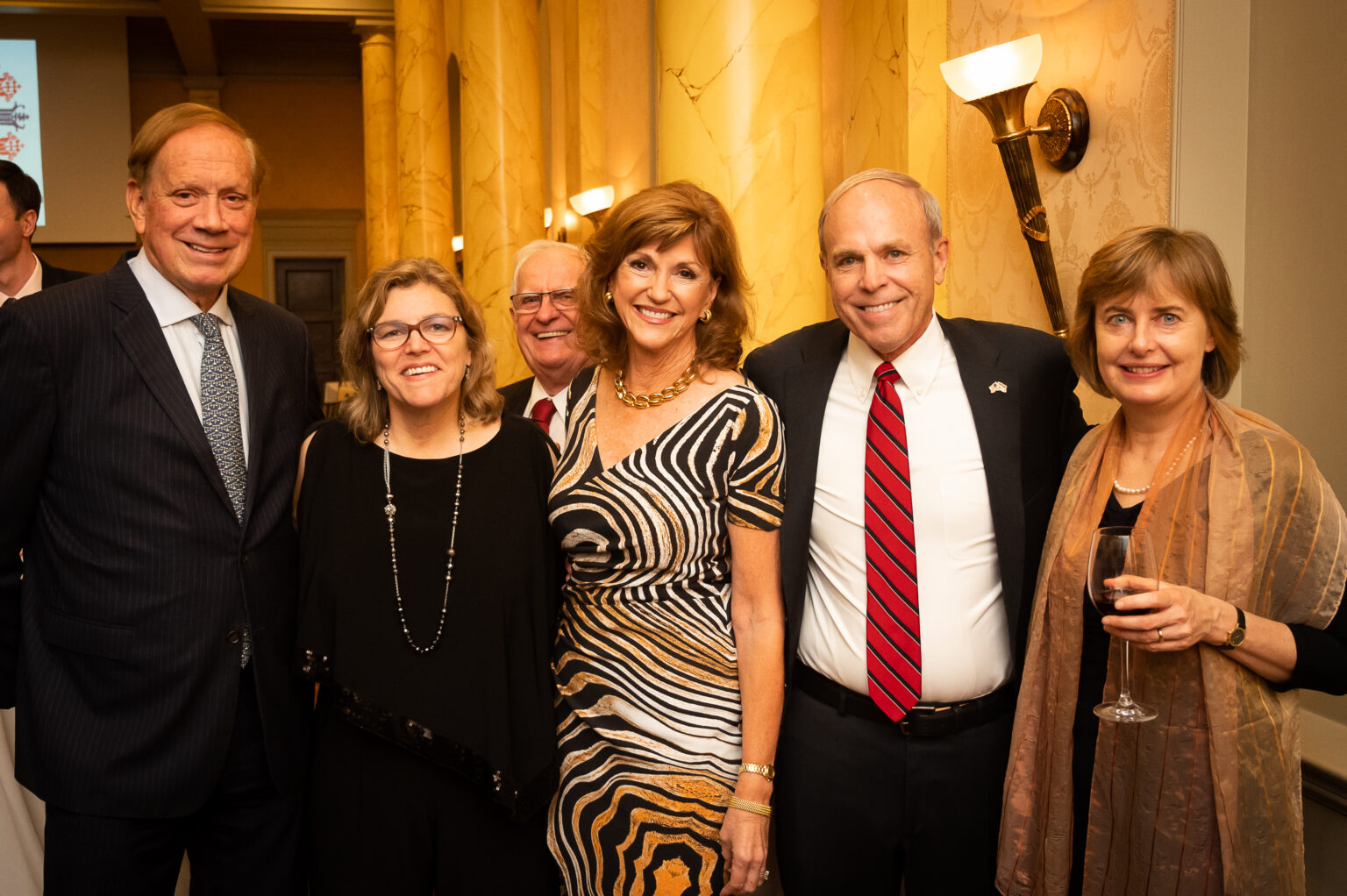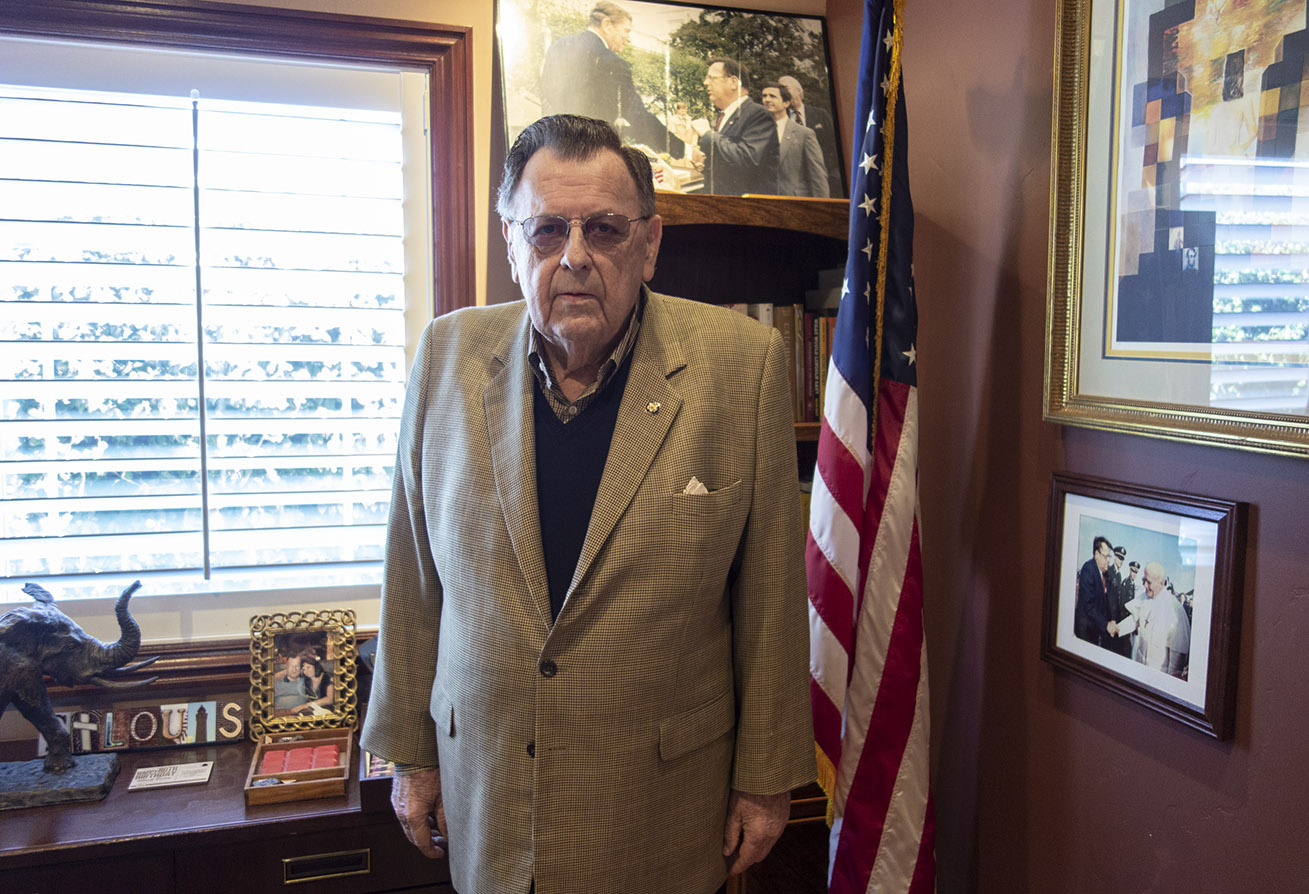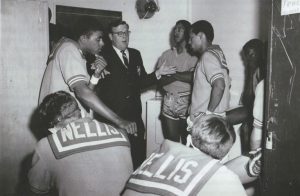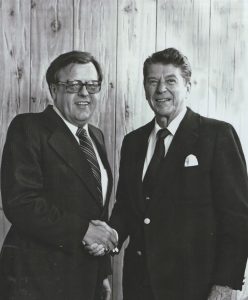
The American Hungarian community's largest umbrella organization recently unveiled the statue of the Hungarian Freedom Fighter in Atlanta.Continue reading

Former Congressman Ernest Konnyu in his San Jose home. Image: Hungary Today
Ernest Konnyu, born Könnyű, is a former US Congressman, native of Tamási, Hungary. Son of teacher and poet László Könnyű, his family fled Hungary first to Austrian war refugee camps after WWII. Four years later in 1949 he emigrated to America where Ernie arrived with his parents as a twelve year old. He immediately realized the opportunities that his new homeland had. After serving in the Air Force rising to the rank of captain, he worked Silicon Valley as director of internal audit at National Semiconductor Corporation. In 1980 he turned his attention to community leadership as he was elected to the California Assembly for three terms through 1980. Konnyu advanced to U.S. Representative in Washington serving one term from 1987 to 1989. Today he is retired living in San Jose with his wife Lillian, where he kindly welcomed the Hungary Today team at his spacious residence.
Are you following the current events in Hungary, if so, what is the issue or topic that interests you the most?
I like to follow Magyar cultural topics. As a retiree I keenly observe political news and events but participate in them infrequently. Regarding Hungary, I like the leadership work of Prime Minister Viktor Orbán. He leads Hungary with a firm hand benefiting from his clear party majority in the Hungarian Parliament. He has been reelected in a democratic way repeatedly while the country prospered economically. I might note that I am a bit biased because I am also a conservative and unfortunately most of Washington, at least today, is not.

Ernie Konnyu at his orange tree in his garden. Image: Hungary Today
You left Hungary as a child, and you have embraced the US as your homeland. America was kind to you and so you must feel privileged to have been given the opportunities that you have received. But do you ever ask yourself what would your life been like had you stayed in Hungary?
I was 8 years old when I left and spent four years in Austrian war refugee camps. In Hungary my life probably would have been lucky as my dad was a teacher and that is a point of respect in Hungary. So, his eldest son would have received some advantages. Dad was respected there as he published 32 books, almost all Hungarian poetry. His name was László Könnyű and even today there is a library in our home town of Tamási, named after him, the Könnyű László Library. There is also a bronze plaque memorial honoring him in our Tamási town square. To answer your speculative question, I would probably stand to be ahead of the ‘average Joe’ if I would have stayed in Hungary.
The US was a different ballgame. The opportunity was there, everyone was going to be at least somewhat rich, so why should I not be one of those? That is America! You can be successful here as my several million dollar home proves while who your parents were does not count for much here. My future in post WW II Hungary was bleak and, frankly, I was too young to even think about it. Fate dictated my future in a bright America.
But in those days being a Hungarian meant something different as compared to those arriving today…
It meant nothing. You were just a war refugee. That is it. Whether you were a Hungarian did not matter at least until the 1956 Hungarian Revolution that gave us an identity here. Until then, that you were a war refugee is what mattered.

Young Ernie (C) with his siblings. Image: Courtesy of Ernest Konnyu
Yet if you are a Hungarian today and came off the plane saying I want to make a living here, do you think the opportunities would be the same as back then? Does it resonate in any different way today than back in the fifties?
Well, today being from Hungary means that you are European, and you are white. Whiteness is now a big deal, good or bad, in the US and quite controversial. Some minorities are almost crazily for population diversity in everyday life especially in jobs, housing and so on. They pretend that race instead of merit is the most important criteria. One of the worst examples is the Progressive Democrat California governor, Gavin Newsom, who is running for President. He is for awarding Blacks millions each as reparations for slavery that was illegal in our country since the 1860s and was never legal in California. Division by race is disgusting, but Black Lives Matter style Black racism is a prominent strain of politics in America. If one wants to screw up an argument, just bring race into it. All kinds of emotions come in which have nothing to do with reality. It is a game: if I am black, I have to do it this way. If I am brown, I have to play the game of life that way. Of course, from that style of discourse logic disappears.
There is no denying that we have a sometimes-undignified row between the Hungarian government and the current US administration. Do you think that this situation is inevitable given the severe, and unbridgeable differences in ideological and ethical issues between Hungarian conservatives and the US left, or is there a way out of this bitter impasse?
No, there is no way out. Progressives in particular and Democrats in general are ideologically attacking the Orbán regime for being conservative including politically funding the Hungarian opposition in the millions of dollars. In America one has to make a reasoned argument to make Hungary count in Washington. The best argument that you have is that Hungary is a member of NATO. Americans, conservatives and even liberals like NATO, because the alliance is useful in controlling Russia. NATO is the one thing that Hungary is a member of, which says you are ok, you are with the good guys, you are not an enemy. Use it daily to your advantage.

The retired politician in his private office. Image: Hungary Today
May I bring up a counter-argument? The US government is spending millions of dollars with the aim of replacing the Hungarian government with one that is subservient to its goals. Furthermore, if Hungary does not count in America, why do you regularly see long editorials bashing it in the largest US newspapers? There must be an aspect that is a thorn in the side of the current administration and opinion-makers that makes them focus sometimes obsessively on Hungary…
Well, that is not the case because the political spending against the Hungarian government is being done, as I wrote, by American Progressive and Democrat forces, not by the U.S. government. The ideological basis of that funding is driven by Progressives and the Democrat forces led by the prominent U.S. billionaire, George Soros, a man born in Hungary. Simplified, their theme is that Hungary is a dangerous right-wing government.

Campaigning in the dressing room. Image: Courtesy of Ernest Konnyu
Is it one?
No, it’s a fully democratic parliamentary form of government with regular elections. The perception on the left is that Hungary is a dangerous right-wing government. My perception is the opposite: Hungary has a democratically elected government that wants to be a friend of the United States. During President Trump’s four years the Hungarians and our country got along well. Trump even received and accepted an endorsement from the Hungarian prime minister Orbán for his re-election. Under President Joe Biden Hungary is badly mistreated as an ideological enemy of the U.S. That will last as long as the Democrats retain control of the White House.
So the country does matter then somehow…
Well, the Trump election endorsement by Prime Minister Orbán is one of many minor things that happened (during the 2020 U.S. election campaign). If Hungary did or did not support Trump, it did not matter in the U.S. The way it was interpreted in American circles was that it benefited Hungary to politically back Trump, so they endorsed him. This is the reason why the current democratic administration thinks Hungary has to be a disaster, because of the Orbán endorsement of Trump.
Practically speaking, Hungary only matters in the U.S. in terms of the past US-Soviet, or current US-Russian relationship. That is why NATO is a key for the leverage on the current Democratic government of the US. That is the connection. That is where Budapest can say, we support America.
So in your view, Hungary could have a leverage by refusing to join the mainstream European approach to Russia, because it prevents the US from controlling the EU in a way that it weaponizes it against Russia. Hungary is bringing counter-arguments to the table, it does not want to conform to Brussels-conceived policies concerning Russia, and is bringing in a counter-narrative that can be interpreted as being against the United States’ interests.
Yes, but Hungary’s justification is pretty good. Obviously the Paks nuclear power station is absolutely vital to the country’s economic success, and they happen to have a contract with the Russians on expanding Paks. That is the justification for their position, and I do not have a problem with that at all, that is a Hungarian necessity.

With President Ronald Reagan. Image: Courtesy of Ernest Konnyu
One could argue that the government in Budapest cannot afford themselves an open conflict with a global superpower like the US, but what choice do they have when they feel bullied and pressured to get in line with US’ geopolitical interests? Does the government have a choice besides resistance that could reduce, rather than increase tensions?
I totally agree. Survive and thrive. You deal with the tides as they come. There is an old WWII saying about the Hungarian government, that was trying to please their Axis ally, Germany, but at the same time to survive as an independent country. The then Prime Minister Miklós Kállay was doing this dance between the two opposing forces, of independence and backing Germany’s war needs. His political dance was called the ‘Kállay double’.

Chatting with local police officers. Image: Courtesy of Ernest Konnyu
But what is the “double” that current Hungary finds itself in between? Moscow or Washington?
There is no final answer for Hungary can not control the large and powerful U.S. and Russian governments so she can not make the final choice. Hungary is subject to the pressures of both countries. So they just have to survive in between the two controlling forces. You have to endure in rough times and hope for the better ones. Such times will come next when once again, Republican presidents run Washington.
Hope is one thing, it refers to the future, but politicians must come up with policies to deal with current issue now.
Simplified, the Hungarian policy makers’ job is to understand how to ‘dance’ between Washington and Moscow forces.
If you had the chance to sit down with policy makers in Budapest, what would you advise them to do in order to bring the two countries together?
Nobody from Budapest asked my opinion but I would advise Hungary’s diplomats to do what I told you, ‘dance the double’. I think the Hungarian government is doing fine. The country is successful. Look at the miracle the Hungarians pulled with Ukrainian war refugees. They allowed hundreds of thousands of Ukrainian refugees to enter Hungary temporarily or to actually settle there, give their kids education and to give jobs to ethnic Ukrainian-Hungarian refugees. That is a large financial burden for a small country of ten million people. Nevertheless, Hungary figured out a way more or less productively to handle that massive refugee movement into their country. It was a miracle that the Hungarians pulled!
Hungary might not matter so much to the US, but the US obviously matters a lot to Hungary. How would you advise the government in Budapest to approach an administration in Washington that is not really interested in dialogue, but mostly in enforcing its radical vision for Europe?
As I keep mentioning, that is a matter of ‘dancing’. Hungary has a good foreign minister, Péter Szijjártó, and I like him. I met him, shook his hand, and I watched his diplomatic dances from time to time. He is handling his tasks well, and P.M. Orbán seems to trust him since he has had that job since 2014. He knows the ‘double dance’.
Groups tied to the US Democrats are donating significant amounts to the Hungarian opposition, and although they are calling it “supporting democratic values”, they are pretty unapologetic about trying to remove the government of Viktor Orbán. Are we Hungarians so backward in current political practices that we regard this as unacceptable meddling in our internal affairs, or is this the standard price for paying for the strategic and military umbrella that the US offers?
You are being ideological in a way that university professors think, as opposed to real politics that much of the world practices. If things changed since 1989, there is no choice but to deal with it. So why worry about it? It is something you cannot control. It is the unfortunate part of being in the minority. Sometimes you just have to endure negative results.

Welcoming Pope John Paul II in America. Image: Courtesy of Ernest Konnyu
We need to make our position understood better and to make our voices heard in the US? What is the best way of getting through to policy makers to make them understand our insistence on for freedom and sovereignty as a small nation?
There is no secret. My initial reaction would be, repeat what you believe in. And remember to whom you are talking to. If you are talking to Democrats, I would emphasize things that Democrats value. And vice versa with Republicans. Its dealing with reality. Remember you are a minor player in terms of America. You have to be aware of where you are standing and then look ahead and see where you want to go.
Would you advise against a homogeneous attitude, saying to both parties, this is where we stand?
That is unwise. It is not the way politics works. Let me preach a bit: one should never lie. That is what corrupted the lives of the Soviet leaders, they always lied. Tell the truth, but the truth that is agreeable to the other side. It is the art of the possible.
We probably do not have a “truth” that the Democrats would be willing to accept.
You do not understand the Democrats then. You have to know the ‘enemy’, so to speak. Talk about goals that you both share. Freedom is a perfect topic. Speak about that because both sides understand and value freedom.

Congressman Ernest Konnyu has recently published his memoirs entitled “Grandpa! Tell Me About Your Good Old Days”, at Xlibris.com. You can read the book preview at KonnyuToCongressBook.com